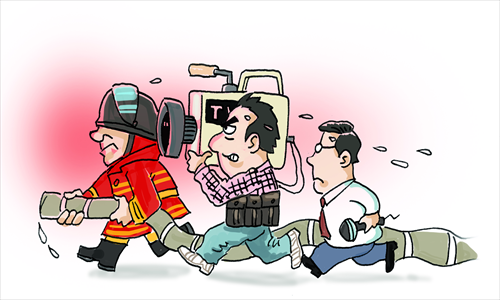Reporters given chance to shine after blast

Illustration: Liu Rui/GT
Tianjin, a northern port close to Beijing, was a quiet city until the giant and lethal blast traumatized the country and the rest of the world last Wednesday. The incident has not only become an occasion to expose the sorry state of the city's emergency response systems, which grimly failed the first responder test, but also a chance for media organizations to practice their rights of access and see whether the authorities protect them.
The morning after the blasts, CNN correspondent Will Ripley was disrupted by a group of people while reporting live outside the main hospital that receives the injured in the incident. The short footage went viral in Chinese social media. People's anger was raised very soon, with a lot of them saying that it is local authorities roughing up foreign reporters for doing their job.
A few hours later, CNN posted a correction on its official Twitter account, saying Ripley was blocked by "upset friends and relatives of victims killed and injured in the China blasts."
Ripley himself confirmed that the situation calmed down when a police officer nearby intervened.
Ripley's experience, although clarified, has still been used by many foreign media as a lead to criticize Chinese officials for harassing journalists and obstructing their investigation and report. They never forget to tell their readers that the Chinese government has a long history of censorship.
But almost a week has passed, and does anyone who pays close attention to the crisis feel there is major information being censored and blocked?
The answer would probably be no. What's more, quite a few investigative reports by the Chinese media have already been published, suggesting there was corruption, poor regulation and illegal dealings behind the blasts.
When Malaysia Airlines MH370 crashed last year, the Chinese media were denounced by the Chinese for failing to deliver timely and in-depth coverage of the tragedy. Their bad performance seemed even worse when contrasted with the reporting by CNN and other foreign media.
But this time, things seem to be the other way around. Most first-hand information was acquired by the Chinese media and their foreign counterparts are slow off the mark. It seems that in most cases, the Chinese media are doing their job without meeting major hindrances.
So it is an unfair judgment that censorship still prevails in the blast reporting all these days.
But to be honest, the Tianjin authorities have done a lousy job in dealing with the media's queries. In a series of press conferences held by the local government, there are sharp exchanges between the reporters and officials, who gave answers such as "I don't know," "I have no information yet," and "We are still investigating," even to a simple question like "Who is the leader of the rescue team?"
Besides, we cannot deny that reporters' rights to access have not been secured as ideally as expected in Tianjin.
There are quite a lot of individual cases being exposed on the Internet. Ripley was blocked again when doing another live report on a wide street. The sturdy man who reached his big hands to cover the camera appeared to be an official based on his carrying a walkie-talkie and giving orders to a few firefighters around. There are also reporters and photographers complaining on their social media accounts about how some junior officials obstructed them.
But these small individual accidents can hardly demonstrate that the Chinese government still sticks to heavy censorship on news reporting.
When Chinese Premier Li Keqiang arrived in Tianjin to inspect the rescue work, he said, in a meaningful way, that without the timely and authoritative release of information, rumors will run wild.
Those who are familiar with how Chinese politics works will understand how a constructive and significant policy from the top is misled and misused by some incompetent and indecisive authorities at the bottom.
It is necessary to clarify that despite many foreign media's accusations, censorship is not a major obstacle for people in knowing what is going on before and after the tragic blasts.
We have seen what the Chinese media can accomplish when their rights to access are protected. But we should expect more, and some local officials should go back to school and learn how to interact with the media.
The author is a reporter based in Beijing. opinion@globaltimes.com.cn